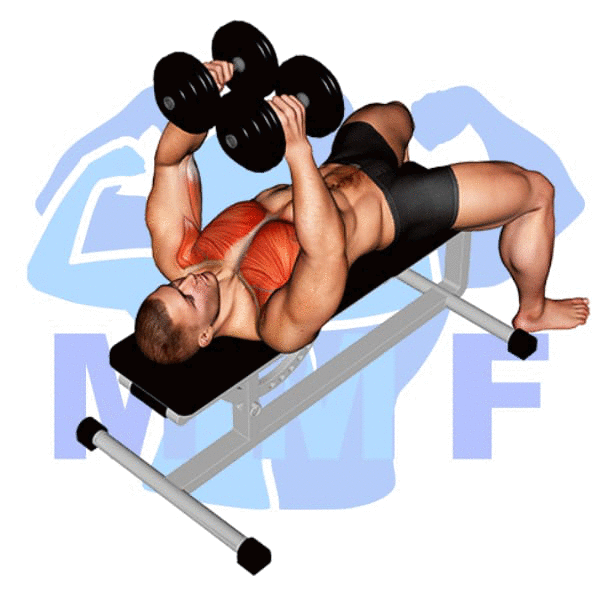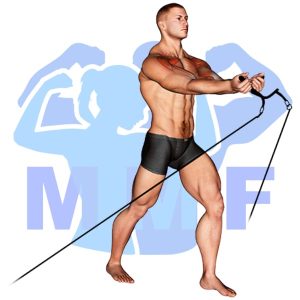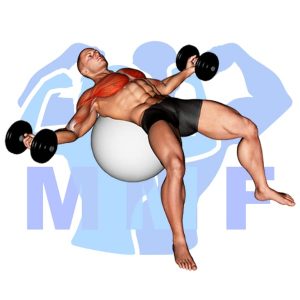“The dumbbell fly is one of the most effective exercises for strengthening and sculpting the chest muscles. However, many people struggle with proper form and technique when performing this movement. If you’ve ever felt aching or discomfort in your chest or shoulders after attempting dumbbell flys, you’re not alone. Poor form and overuse are common causes of this issue, but don’t worry – there is a solution. In this post, we’ll cover everything you need to know to master the dumbbell fly and avoid discomfort or injury.”
Dumbbell Fly Summary
- Primary Muscles: Pectoralis Major – Sternal
- Secondary Muscles: Latissimus Dorsi, Levator Scapulae, Pectoralis Major – Clavicular, Pectoralis Minor, and Rhomboids
- Equipment: Dumbbells and Bench
- Mechanics Type: Isolation
- Force: Push
- Utility: Auxiliary

Dumbbell Fly Instructions
- Get started by taking up the dumbbells and lying down on a flat bench.
- Begin with the dumbbells up over your chest with arms extended and palms facing together.
- Next spread your arms and chest apart, keeping your elbows locked. Your elbows can be slightly bent.
- After you have reached your maximum range of motion, pull your arms back together with your chest.
- Repeat to completed your desired repetitions.
Video Tutorial
Dumbbell Fly Muscles
Target (Agonist)
- Pectoralis Major, Sternal
Synergists
- Latissimus Dorsi
- Levator Scapulae
- Pectoralis Major – Clavicular
- Pectoralis Minor
- Rhomboids
Dynamic Stabilizers
- None
Stabilizers
Antagonist Stabilizers

Benefits of Dumbbell Fly
The Dumbbell Fly exercise is particularly beneficial for developing the muscle known as the Pectoralis Major – Sternal. This muscle, located on the front of the chest, helps to draw the arms inwards and is involved in stabilizing and protecting the shoulder joint. When performing the Dumbbell Fly exercise, this muscle is targeted, which can lead to increased strength and stability in the chest area. Furthermore, since this exercise involves lifting weights with both arms simultaneously, it can help to improve coordination and balance while also helping to develop core strength.
Tips for Performing Dumbbell Fly
In order for you to develop the optimal improvement, you must adhere to these simple tips. Most Importantly, whenever you wish to minimize your likelihood of injuries, you need to stick to these tips.
- Have A Plan At The Gym. Make sure you plan your exercise session beforehand when you have a end goal. When your objective is just simply to maintain, you should continue to have a plan when you get to the gym.
- To Focus On Power And Speed, Increase The Acceleration Of Your Exercise. Keep nice technique or you will be more suboptimal to personal injury. You will need to drop the weight to 50-60% of your single rep max weight when training for speed and power. Also, you will need to now pause between each rep.
- Work out In A Place Where You Are Able To Check Out Your Technique In A Mirror. You are looking to have the opportunity to keep effective technique on every single repetition, so that you can achieve that you have got to have a way to look at and corect yourself.
- Build Your Form In Advance Of Increasing The Load. Developing ideal form will definitely assist preventing injury and faltering quickly. Good Technique can assist you to develop muscle more quickly.
Benefits and Tips Video
Frequent Mistakes To Avoid
You will need to keep from making these common issues to manage solid technique and continue to develop gains. Additionally, when you stop these mistakes you will lower the possibility of having an injury.
- You’ll Do Better To Not implement improper form. Poor form might be the fast path to have a physical injury.
- Stop Trying To Skip Out On A Warm-Up. Properly prepaing your Muslces is the Best way to prevent injuries.
- Avoid The Urge To Skip Rest Days. Over-training can in fact help make you weakened instead of stronger.
Find More Dumbbell Exercises Here
Variations and Complementary Exercises
If you are looking to switch up your routine, there are a variety of alternative exercises that can be used to target the same muscles as the Dumbbell Fly. These exercises will be able to provide an equally effective workout while allowing you to mix up your routine. Below is a list of variations, complementary, or alternative exercises for the exercise Dumbbell Fly.
Incline Dumbbell Fly

Incline Dumbbell Fly is an exercise that complements or serves as an alternative to the Dumbbell Fly. This exercise targets the same muscles but with a slightly different angle of motion. The exercise is performed while lying on an incline bench with both arms extended out to the sides and palms facing each other. From this starting position, the dumbbells are then brought together in an arc-like motion, allowing the chest muscles to contract. The Incline Dumbbell Fly also helps to open up the chest and build strength in the upper back and shoulder muscles.
Incline Dumbbell Twisted Flyes

Incline Dumbbell Twisted Flyes are an excellent exercise for strengthening the shoulder muscles and providing an alternative to the traditional Dumbbell Fly. This exercise involves lying on an incline bench with a pair of dumbbells in each hand, then raising the arms out to the sides and twisting them inward so that the palms face each other. This exercise not only strengthens the shoulder muscles, but also engages the core and arms, making it a great complementary exercise to the traditional Dumbbell Fly. Incline Dumbbell Twisted Flyes are a great way to add variety to your workout and get a more balanced shoulder muscle workout.
Low Cable Fly

Low Cable Fly is an excellent complementary or alternative exercise for Dumbbell Fly. It utilizes a low cable pulley to provide tension to the chest muscles as you move your arms in a fly-like motion. The range of motion is slightly shorter than with the Dumbbell Fly, but the tension on the chest muscles is much greater. This exercise is great for targeting the inner and outer chest muscles, as well as the shoulder muscles. It can also be used as a finishing exercise to really fatigue the chest muscles.
Check Out These Top Dumbbell Exercises
Lying Cable Flys

Lying Cable Flys are a great complementary or alternative exercise to Dumbbell Flys. This exercise utilizes a cable machine to create tension in the chest muscles while lying on a flat bench. The cable machine allows for the lifter to maintain tension in the chest muscles throughout the entire range of motion, which is not possible when performing dumbbell flys. Additionally, the cable machine allows for more weight to be used when compared to dumbbells, allowing for increased strength gains. Lying Cable Flys are an effective exercise to increase strength and muscular development in the chest muscles.
Stability Ball Cable Flys

Stability Ball Cable Flys are a great complement or alternative to Dumbbell Flys. This exercise targets the chest and arms in a similar fashion to the Dumbbell Fly, but with the added stability of a stability ball. The ball helps to create tension on the chest and arms throughout the entire range of motion, helping to increase muscle activation and growth. This exercise is also beneficial for improving balance and stability as it requires the body to remain balanced throughout the movement. The cable also allows for more control over the weight being used, allowing for a greater range of motion and more precise targeting of specific muscle groups.
Stability Ball Dumbbell Fly

Stability Ball Dumbbell Fly is a great alternative or complementary exercise to the standard Dumbbell Fly. This exercise helps to increase core strength, stability, and balance while still providing a great chest workout. During the exercise, you lie on the stability ball while holding two dumbbells above you, with your palms facing each other. Then, you slowly lower the dumbbells out to the side, keeping your arms straight and your back in contact with the ball. As you lower the dumbbells, you should feel a good stretch in the chest muscles. Finally, you raise the dumbbells back up to the starting position, squeezing your chest muscles as you do. This exercise helps to target the chest muscles while also engaging the core for added stability and balance.
Find More Chest Exercises Here
Opposing Complementary Exercises
In order to create balance between the muscles being worked with Dumbbell Fly, it is important to include exercises that work the opposing muscles. These exercises will help to improve strength and stability in the upper body, while also avoiding muscle imbalances. Here are some exercises that complement Dumbbell Fly by using opposing muscle groups:
Barbell Incline Row

The Barbell Incline Row is a great exercise to pair with the Dumbbell Fly. The Barbell Incline Row focuses on the opposing muscle group of the chest, the back, and helps to create balance in the body. By performing the Barbell Incline Row, you are recruiting the lats, middle back and rear delts to pull the weight up. This movement is complementary to the Dumbbell Fly because it provides an opposing force, strengthening both the chest and back while preventing muscular imbalances.
Barbell Reverse Grip Bent Over Row

The Barbell Reverse Grip Bent Over Row is a great complement to the Dumbbell Fly exercise. This exercise works out the opposite muscle group to the Dumbbell Fly, engaging the back muscles more than the chest muscles. This exercise helps strengthen the back muscles, which are essential for good posture and avoiding injury. The exercise can be done with a barbell or dumbbells, depending on preference and strength level. By alternating between exercises that work out opposing muscle groups, such as the Dumbbell Fly and the Barbell Reverse Grip Bent Over Row, you can achieve a well-rounded workout.
Cable Rope Face Pull

The Cable Rope Face Pull is a great exercise to complement the Dumbbell Fly as it works the opposite muscle groups. This exercise involves pulling a rope attachment attached to a high pulley with your arms extended and out to the sides. As you pull the rope towards your face, you are engaging the rear deltoids, rhomboids, and upper back muscles. By performing this exercise after the Dumbbell Fly, you are working the opposing muscles which helps to create balance and stability throughout the entire body.
Fly Your Way to a Stronger and Healthier Body
If you’re looking to add an exercise that targets your chest, shoulders, and arms, look no further than dumbbell flys. This versatile exercise can be performed lying down, standing up, or even on an incline bench. By using dumbbells, you can also work on building balance and stability as you complete the movement. Dumbbell flys can be modified to fit any fitness level, making them a great addition to any workout routine. Just remember to start with lighter weights and focus on proper form to avoid injury.
References: Wikipedia | ExRx.net | PubMed.gov | Comprehensive List of Chest Dumbbell Exercises




